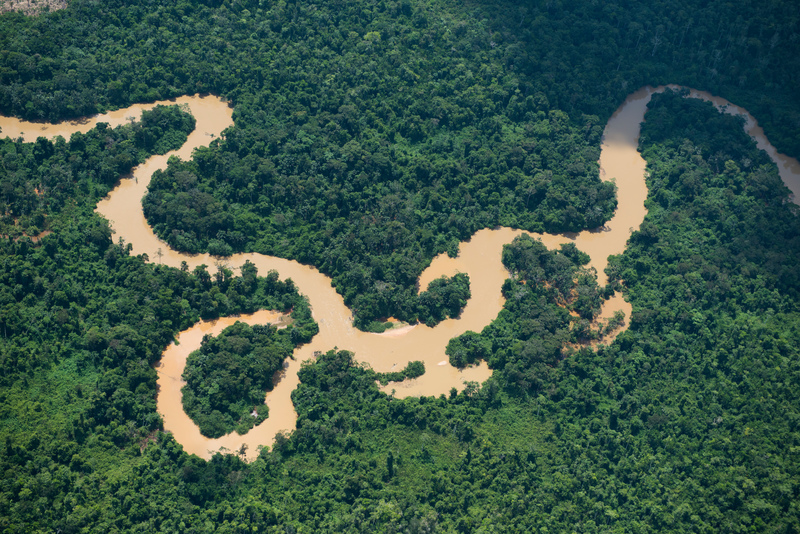The municipality of Portel, in Pará, is at the epicenter of a discussion about the relationship between carbon market projects, public land and collective territories in the Amazon.
The voluntary carbon credit market has experienced significant growth worldwide in recent years, driven by companies seeking to offset their greenhouse gas emissions. According to the main survey of this sector by the Ecosystem Marketplace initiative, by 2021, this market had quadrupled over the previous year and reached $1.9 billion in transactions. The majority of voluntary carbon credits traded are in the forestry and land use change sector, accounting for 67% of the value traded in 2021.
However, despite this substantial increase, the voluntary carbon credit market remains relatively small compared to its potential. In fact, its turnover is equivalent to the annual global market of black pepper exports. Other markets for forest-friendly products even exceed this size. Nonetheless, it is precisely its potential for expansion that has attracted investors and new companies to this field.
While this market can contribute financially to the maintenance and restoration of forests, concerns have arisen regarding its ability to deliver reliable results in reducing carbon emissions. Moreover, accusations of rights violations linked to forest carbon projects have increased, especially in collective territories. A recent example is currently unfolding in the municipality of Portel, in Pará.
While this market can contribute financially to the maintenance and restoration of forests, concerns have arisen regarding its ability to deliver reliable results in reducing carbon emissions. Moreover, accusations of rights violations linked to forest carbon projects have increased, especially in collective territories.
Brenda Brito, lawyer and PhD in Science of Law from Stanford University
In late January, the Pará State Prosecutor’s Office (MPPA) organized a public hearing in Portel to address allegations of irregularities in voluntary carbon credit projects. Some cases have already been the subject of journalistic investigation in 2022. Among the problems, projects overlapping public lands without governmental authorization, absence of free prior and informed consent of communities involved in the projects, and disadvantageous conditions of negotiations between companies and communities stand out.
Representatives of the state government, communities, municipal governments, and companies linked to the voluntary carbon market participated in the hearing. In particular, different state government agencies, such as the Attorney General of the State (PGE), the Land Institute of Pará (Iterpa), the Secretariat of Environment and Sustainability (Semas), and the Institute of Forest and Biodiversity Development (Ideflor-Bio) participated. The minutes of the meeting are already available in Portuguese.
Carbon projects overlapping with state agro extractivist settlement projects (PEAEX) without government authorization and the improper use of rural environmental registration (CAR) as land proof for such carbon projects are two reasons for this state mobilization. A few days after the hearing, Semas announced the cancellation of 219 irregular CAR registrations linked to carbon projects in Portel. It also suspended another 735 CAR registrations with indications of irregularities.
Other initiatives in this case are worth mentioning. First, before the hearing in Portel, Iterpa created a Dialogue Table on State Collective Settlements to discuss the regulation of economic activities in these territories, using the case of Portel as a pilot. Second, the State Public Defender’s Office has created a Working Group on Sustainable Settlement and Carbon Credits to monitor this type of demand.
All this mobilization by public agencies is crucial to reverse rights violations and prevent new problems from occurring. However, it is essential that the state government bring the discussion about carbon projects in state areas to the ongoing process of elaboration of Pará’s jurisdictional REDD+ system. It is not a matter of regulating voluntary market initiatives in a general way, which is outside the mandate of the state government. But the state needs to define how these activities will occur in state government areas, whether such territories are granted to communities or not.
A REDD+ system needs to define which state agency will be responsible for the theme. The case of Portel shows that several agencies have mobilized, but it is essential to indicate a focal point coordinating the state’s actions. The creation of a grievance redress mechanism to receive complaints and seek appropriate ways to redress must also be part of this system. Another necessity is to provide legal and technical assistance structures on this topic for communities present in collective territories owned by the state. It is imperative to establish legal and technical assistance structures for communities residing in collective territories owned by the state to address this issue.
In addition, it is essential to closely monitor the discussion surrounding the Provisional Measure (MP) 1.551/2022, which outlines aspects relevant to carbon market transactions in public forests. This MP amends the public forest management law and permits the commercialization of carbon credits as part of a forest concession.
While the MP borrowed some elements from Bill 5518/2020, which aims to improve the forest concession model, there is at least one significant difference between the two concerning the carbon issue. The bill proposes a conservation concession category, primarily focusing on the conservation of ecosystem services and biodiversity for natural area management activities. However, the Provisional Measure does not consider this specific type, indicating that the commercialization of credits would have to be linked to a concession for forest management. This difference is significant since it could prevent the government from granting a concession centered solely on environmental services.
Other cases in the Amazon, akin to Portel, have arisen regarding conflicts and rights violations associated with carbon projects in collective areas. Therefore, it is imperative to determine the necessary governmental measures to prevent the forest carbon market from having adverse consequences for the population safeguarding the forest.
The opinions expressed in this article are the writer’s own.



